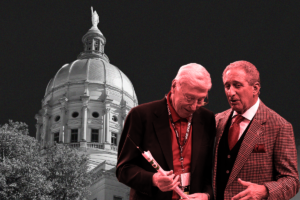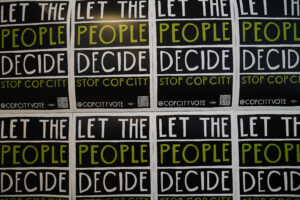Will Brian Kemp Get Away With Suppressing Georgia’s Black Vote?
The GOP gubernatorial candidate has purged tens of thousands from the rolls. An activist and an investigative journalist assess his chances. Georgia Republican gubernatorial candidate Brian Kemp gives a thumbs-up to supporters in Athens, Ga. (John Bazemore / AP)
Georgia Republican gubernatorial candidate Brian Kemp gives a thumbs-up to supporters in Athens, Ga. (John Bazemore / AP)
What follows is a conversation among activist Anoa Changa, investigative journalist Greg Palast and Aaron Mate of the Real News Network. Read a transcript of their conversation below or watch the video at the bottom of the post.
AARON MATE: It’s The Real News, I’m Aaron Mate.
The governor’s race in Georgia has been one of the most heated contests of the 2018 Midterms. And now, days later, its two contenders are at odds over whether or not it’s over. Republican candidate and Georgia Secretary of State Brian Kemp has declared victory over Democrat Stacey Abrams with a lead of over 63,000 votes. On Thursday, Kemp announced he is resigning as Secretary of State. And moving forward with the transition.
BRIAN KEMP: We will work together in the days, weeks and months ahead to ensure a smooth transition that keeps our state on the path for prosperity, growth and opportunity. In addition to having the right team, you need energy and focus. That is why, effective 11:59 AM today, I’m stepping down as secretary of state.
AARON MATE: The fact that Kemp was secretary of state in a vote in which he was a candidate is just one part of the controversy. As Georgia’s top election official, Kemp has overseen a longtime crackdown on voting rights. Just before the election, Kemp froze the voting registration of some 53,000 people, most of them Black. His opponent, Stacey Abrams, is not conceding and is calling for all provisional ballots to be counted.
STACEY ABRAMS: We’re here tonight to tell you, votes remain to be counted. There are voices that are waiting to be heard. Across our state, folks are opening up the dreams of voters and absentee ballots. And we believe our chance for a stronger Georgia is just within reach, but we cannot seize it until all voices are heard. And I promise you tonight, we are going to make sure that every vote is counted. Every single vote. Every vote’s getting counted.
AARON MATE: Joining me to discuss the ongoing race in Georgia for governor are two guests. Greg Palast is an investigative journalist whose books include the best-selling, The Best Democracy Money Can Buy, which also was turned into a film of the same name. Just last month, Greg Palast joined a coalition of civil rights groups in suing Brian Kemp for removing over 340,000 Georgians from the voter rolls. And Anoa Changa is an attorney and host of the podcast, The Way With Anoa, resident of Georgia where she is joining us from.
Welcome to both. Anoa, I’ll start with you. What is the latest? As we’re speaking, I believe the Abrams campaign is giving an update on their status. Let me ask you first. I mean, they are trailing by a considerable amount. So in terms of the vote count, if these provisional ballots that they want can be counted, could that be enough to make up the difference?
ANOA CHANGA: I think we have an even bigger problem. From the meeting I just came out of this morning, the Abrams legal team is having a press conference right now. This is noon on Thursday, I just came out of a Board of Elections hearing here in Fulton County, which is where Atlanta is, and we actually just found out that the count that the county has is actually different from what the secretary of state’s office is even reporting. So we don’t actually even know what the actual vote really is, considering the data that Brian Kemp has been reporting may or may not even be entirely accurate if this is something that has played out in other counties as well.
They reported over 16,000 absentee ballots were counted here in Fulton County, his website showed only 4000 and claimed that the total was complete. So we really don’t know what to believe and trust. And quite honestly, considering what he pulled this past weekend with this fake hacking investigation, which we also found out caused the websites- there’s an internal website that the different Board of Elections use as well as the public website usually sync up so that people with absentee ballots can track their ballots as they’re being counted, processed and received. And for whatever reason, that syncing has not been happening and these are both websites that are controlled by the secretary of state’s office.
We also have the secretary of state, who has not only just been biased towards himself, his own favorite candidate, but he has blatantly breached whatever duty of- just his impartiality in an election that he is supposed to have as the chief election officer, as we’ve also seen by him declaring himself winner, despite the fact that only four or five counties out of 159 have even certified elections, and larger counties like Fulton County will not be certified until Tuesday, given that Monday’s a federal holiday.
AARON MATE: Just to explain that for anyone who is not familiar with what Anoa referenced, so right before this vote, again, Brian Kemp is overseeing, even though he is a candidate in it, just before he accused Democrats of hacking attempts of voting sites but provided no evidence. Let me go to Greg Palast. What’s your response to Kemp resigning as secretary of state, which has been a demand for a long time, but of course that demand was made before the vote, not afterward.
GREG PALAST: Yeah, I mean he decided who could vote. Remember, this guy purged half a million voters in the past year, in 2017, half a million Georgian voters. In my investigation, which began for Rolling Stone and now for the Palast Investigative Fund, we actually went through, name by name, top consultants in address verification. He removed about 400,000 people for supposedly moving from either their home county or out of Georgia. And 340,134 of those people have never moved, have never moved. It’s a mass, mass ethnic cleansing of the voter rolls. And therefore, you have a massive number of provisional ballots. So obviously, Kemp should have resigned and there should be no Republican official on it.
They have one of his flunky deputies now take over and basically make it appear that there’s some type of impartiality. That’s completely nuts. I mean, the question for me, really, for the Abrams campaign, is are they really going to fight ballot by ballot on provisional ballots and the absentee ballots? I know one absentee voter whose ballot was disqualified, my daughter, in Savannah. And I can tell you that I went to polling stations where they usually give out three, four, five provisional ballots. They were giving out fifty, and that’s because all of these purged voters never were notified by Brian Kemp that he had removed them from the voter rolls. They got no notice. So people like the filmmaker here in Atlanta, Rahiem Shabazz-
AARON MATE: Greg, let me stop you there because we have the clip. You went with Rahiem Shabazz to the polls and you followed him as he filled out his ballot. This is what happened.
GREG PALAST: Rahiem went to vote, but they didn’t let him vote on a ballot ballot, they gave him a provisional ballot, a placebo ballot. You think you voted, but maybe not.
RAHIEM SHABAZZ: Once I get the provisional ballot, the lady hands me- it looked like a biohazard bag. So I have no number to verify that I actually voted. These are the tactics of Brian Kemp and this is voter suppression and he is the chief of voter suppression.
AARON MATE: That’s Rahiem Shabazz, who Greg Palast interviewed at the voting site. Another voter who Greg Palast interviewed was someone who was denied the right to vote. She is 92 years old. Her name is Christine Jordan.
GREG PALAST: Has this ever happened to you before?
CHRISTINE JORDAN: Never.
GREG PALAST: How long have you been voting?
CHRISTINE JORDAN: All my life, ever since I was old enough. I’ve been voting right here ever since 1968.
JESSICA LAWRENCE: And it’s just- it’s horrible. And I say that because the West End- she’s been in this community back when they were doing sit ins. She had civil rights meetings in her home. And today to come out and then not be able to vote and no one can give you explanation, it’s extremely emotional and it bothers me. It bothers me to my core. Like, there’s actually no record of her whatsoever voting in any election whatsoever and it’s ridiculous.
AARON MATE: That last voice there was Jessica, the granddaughter of 92 year old Christine Jordan, who was turned away at the ballot box. Greg Palast, talk about these cases.
GREG PALAST: Well, by the way, Christine Jordan is Martin Luther King’s cousin. Here we are 50 years later. And she talked about the family and Daddy King and everyone at her house, Coretta. And so the real question is, Will Stacey Abrams take these voters and go into federal court and say that they were purged wrongly, and their provisional ballots should count? If that happens, and she can prevail, that Brian Kemp purged the voter rolls to his benefit and has set down a rule that if a voter was- even though they’re a legal voter they haven’t moved, that they are at their legitimate address and he purged them wrongly, he’s still directing counties not to count those provisional ballots. It’s like, “Tough luck. If I purged you, you’re purged, baby, and you don’t get to vote.”.
And in fact, he was advising counties not to even give out provisional ballots, not to even give them out. So that’s what’s going on. Stacey Abrams, by the way, does not have to win in the first round, just make sure that Kemp stayed below 50 percent. Then we can get these people back on the voter rolls, 340,000 of them, so they can vote.
AARON MATE: Greg Palast, I know you have to go, so we appreciate your time and for people who want to check out more of Greg’s reporting from Georgia and to support it, you can go to gregpalast.com.
Anoa Changa, back to you. Let’s talk about that the question that Greg raised there, in terms of is Abrams and is her campaign going to be willing to contest this, basically, ballot by ballot? What do you think the answer is?
ANOA CHANGA: I think, from what she has said, that every vote must count, that that’s what they will likely do. I’m not quite sure exactly, because I look forward to actually going back and watching a replay of the legal team’s press conference to see exactly what the strategy is. I do know that other organizations- I have a friend who’s a lawyer who’s been involved in some of the civil rights elections lawsuits that have been going on. She’s actually one of the people that helped make sure that Morehouse students were able to go vote at Booker T. Washington Tuesday Night. She was saying that there was more coming down the pipeline.
Of course, because of the ongoing nature of litigation, she could not tell me what that more actually is. But a lot of people, different organizations, lawyers, no one is taking this lightly right now. And this is not about being upset that Stacey Abrams didn’t win outright. This is about a miscarriage of justice, this is about undermining our democracy, and this is probably one of the greatest travesties that we’ve seen in the modern era, including 2000’s Bush v Gore. And I’m really thankful that Stacey Abrams is not Al Gore and is not being advised just step aside and let this happen. We have watched Brian Kemp exploit his position and disenfranchise people nonstop. He’s been sued numerous times over the past eight years, we’ve discussed this previously.
And watching what he just did in this past week alone has been extremely problematic in listening to the Board of Elections here in Fulton County, discussed various things about vulnerabilities, about how the sites aren’t linking up properly. Because in this fake investigation he claimed needed to happen, it makes me wonder what else did this investigation create havoc-wise in terms of the internal systems, in terms of people being able to track their absentee ballots. And even with the provisional ballots, will people be able to check on the status of their ballots in time to make sure they count, by the close of business tomorrow? There’s a lot at stake right now.
AARON MATE: Even just hearing the individual stories that come out in Georgia, that exemplify voter suppression. I mean, that video we saw there of a 92 year old woman, a cousin of Dr. King, being turned away. We have the story of a group of Black senior citizens taking a bus to go do some early voting and then being stopped by state officials. You have a case where a voting site worker was sued by the state and charged with a felony because she gave some pretty simple assistance to a voter who didn’t know how to use the machine. What, anecdotally, Anoa, can you tell us about what you’ve heard about how voter suppression has played out?
ANOA CHANGA: I just had the opportunity to meet the state board president for the NAACP this morning at the meeting I referred to. And the NAACP, there’s been a couple articles about this, about how people were trying to vote for Stacey Abrams and the machines would jump and select Brian Kemp instead. Now, thankfully, the people they talked to, their members, and they knew what steps to take, how to get help. But imagine being the average voter who wouldn’t know how to go talk to a poller, how to get help, how to make sure the card isn’t going to register for the opponent, the person you’re not voting for. Think about how frustrating that can be for the average person. It’s one story that we’ve heard, and it’s been recounted mostly by people who said that the ballots were shifting.
But the other thing that we learned this morning, State Senator Nikema Williams, she’s State Senator here in Georgia, she recounted- and she was in her capacity actually as a citizen and also as the Aunt of a Spellman sophomore who talked about when she went to go vote, she’s actually one of those people who tried to vote at the Booker T. Washington site, one of the places that had so many issues, she went to vote, she knew she was registered, her Aunt is a State Senator and is very involved. So she knew what her rights are. This is someone who knew the process. And she was told that she was not registered, she was not on the books, she did not exist. She knew what questions to ask, she knew who to press, she knew how to press. And so finally, they finally found her name, and she ultimately was allowed to vote.
How many other students from Spellman and Morehouse, how many other residents in the greater community did this happen to, who were told they were not on the rolls, they did not exist, ultimately for their names to probably really to actually have been there, and were discouraged and turned away? And in fact, this young woman actually asked for a provisional ballot, also, again, understanding what her alternatives were, and she was told that she wasn’t allowed to get one because it would be unfair for to get a provisional ballot because they only had two remaining, and what if other voters actually needed it more? So this is a problem.
And they were saying things like, well, they extended times at the Pittman Rec Center here until 9:00, but there was no one in line as of 8:45. How many people went home discouraged on Tuesday because you had four hour wait times in Gwinnett County, where for whatever reason, out of all the elections that we’ve had in just this year alone, we’ve had special elections, primaries, runoffs, just this year alone, why would anyone set up voting machines in Gwinnett County, in a heavily diverse district, that have no power cord, so the machines died, causing four hour waits and more. And they’re like, “Well, we extended the times.” How many people knew to go back? How many people could actually go back after taking time off of work, after getting babysitters for their kids or whatever else? I mean, if you’re on public transportation and you have a limited income, how can you afford to keep going back and forth to the place because people are like, “Oops, we messed up.”
No, there’s a lot of problems. The fact that Fulton County had 700 sitting in a warehouse because they didn’t anticipate the huge turnout, even though we had record turnout in our primary. It’s insane. Early voting was almost at the same level as 2016, which was the presidential election cycle We had 60 percent voter turnout here in Fulton County, which according to the testimony this morning at the hearing, is the most in the modern era. And so, there are so many signals, there were so many like, “Oops, we’re sorry, the secretary of state didn’t give us better evidence.” We have a derelict secretary of state, whether he’s resigning tonight or not, and I’m appalled that Boards of Election did not act. I’m appalled there’s no legal recourse that these government entities, who are ultimately supposed to serve us and ultimately have a duty, could not have taken it and made sure our elections went better and smoother on Tuesday.
AARON MATE: Anoa, now we have to wrap, so I just have a quick question, and maybe it’s obvious. But is there a sense for you and for Abrams supporters who you speak to, is there a sense that this election has been stolen?
ANOA CHANGA: Absolutely. I mean, when you look at- we already knew. We already knew what the issue was going up against Brian Kemp, right. But when you hear the collective, when you hear things- I talked to a co-worker, I was checking tape for a candidate downstate, I talked to a co-worker and she was actually the one who pointed out to us that it is unheard of that you set up machines without the power cords in them. That’s literally something you’re supposed to do when you set the machines up. There’s no reason why there were no power cords in those machines. I mean, when you look at the egregious errors, listening to the Board of Elections staff here in Fulton County talk about the directions. The fact that it was unclear when the vote was even supposed to be certified and because it’s supposed to, by law, be certified by Monday, but it’s a federal holiday. So there was no guidance.
Brian Kemp literally just decided that he won, that’s it, it doesn’t matter what’s outstanding. We’ve seen record turnout, we’ve seen so much happening, and we’ve had someone that has been an obstructionist to justice and democracy across the board. So absolutely it was stolen and it’s frustrating. And even the fact that he has suppressed the vote and he’s been so blatant and no one has been able to do anything to stop him has also, in itself, been a voter suppression tactic because of people who think, well, it doesn’t matter if we vote or not, he’s just going to steal the election anyway. So yeah, we do.
AARON MATE: We’ll leave it there. Anoa Changa, attorney, podcast host. Thanks very much.
ANOA CHANGA: Thank you.
AARON MATE: We were also joined earlier by Greg Palast, investigative journalist.
I’m Aaron Mate for The Real News.
Your support is crucial...
As we navigate an uncertain 2025, with a new administration questioning press freedoms, the risks are clear: our ability to report freely is under threat.
Your tax-deductible donation enables us to dig deeper, delivering fearless investigative reporting and analysis that exposes the reality beneath the headlines — without compromise.
Now is the time to take action. Stand with our courageous journalists. Donate today to protect a free press, uphold democracy and uncover the stories that need to be told.






You need to be a supporter to comment.
There are currently no responses to this article.
Be the first to respond.